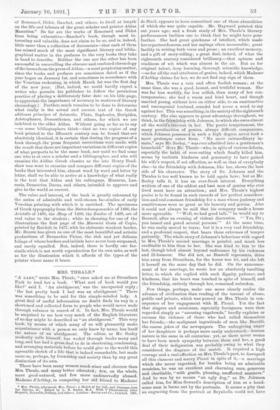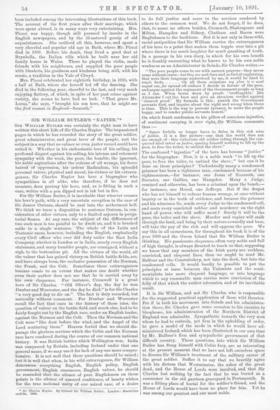MRS. THRILE.* "A LADY," wrote Mrs. Thrale, "once asked me
at Streatham Park to lend her a book. ' What sort of book would you like P' said I. An abridgment,' was the unexpected reply ; the last pretty book I had was an abridgment." There was something to be said for this simple-minded lady. A great deal of useful information no doubt finds its way in a shortened and collected form to people who would never wade through volumes in search of it. In fact, Mrs. Thrale would be surprised to see how very much of the English literature of to-day might be described as " an abridgment." This very book, by means of which many of us will pleasantly make acquaintance with a person we only knew by name, has itself the nature of an abridgment. The editor, as Mr. Seeley modestly calls himself, has waded through books many and long, and has had a great deal to do in shortening, condensing, and arranging materials before he could give to the world this agreeable sketch of a life that is indeed remarkable, but made more so, perhaps, by friendship and society than by any great distinction of its own.
There have been many women much wiser and cleverer than Mrs. Thrale, and many better educated ; few, on the whole, more good-natured, and few more undeservedly abused. Madame d'Arblay, in comparing her old friend to Madame
• him Titres, afterwards Mil. Piaui a Sketch of her Life, and Passages from her Diaries, ,Cc. Editod by L. B. Seeley, M.A. With 9 Illustrations after llogarth, Reynolds,. Zolfany, and others. London : Seeley and Co., Limited. 1591.
de Steel, appears to have committed one of those absurdities of which she was quite capable. Mr. Hayward pointed this out years ago; and a fresh study of Mrs. Thrale's literary performances inclines one to think that he might have gone further. She had great quickness of intellect, which made• her repartees famous, and her sayings often memorable ; great facility in writing both verse and prose ; an excellent memory,. and a gift of story-telling ; a great deal, indeed, of what the eighteenth century considered brilliancy,—that aptness and readiness of wit which was almost in the air. But as for original talent, deep learning, thorough scientific knowledge, —as for.• all the real attributes of genius, indeed, which Madame d'Arblay claims for her, we do not find any sign of them.
Mrs. Thrale was a vain and often foolish woman ; at the same time, she was a good, honest, and truthful woman. She was far less worldly, far less selfish, than many of her con- temporaries; she had a warm and kind heart, and though married young, without love on either side, to an unattractive and uncongenial husband, scandal had never a word to say against her. This was something, in the society of the eighteenth century. She also appears to great advantage throughout, we think, in the friendship with Johnson, to which she owes almost all the world's interest in her. The poetic temperament, the many peculiarities of genius, always difficult companions, which Johnson possessed in such a high degree, never took a, more grotesque outer form. " No more extraordinary in- mate," says Mr. Seeley, " was ever admitted into a gentleman's. household." Here Mr. Thrale—who, in spite of various defects, especially the habit of over-eating which finally killed him, seems by taciturn kindness and generosity to have gained his wife's respect, if not affection, as well as that of everybody else—in the friendship with Johnson, like her, shows the best Bide of his character•. The story of Dr. Johnson and the Thrales is too well known to be told again here ; but as Mr. Seeley tells it, it has an ever-fresh interest. Everything written of one of the oddest and best men of genius who ever lived must have an attraction ; and Mrs. Thrale's highest praise is to be found in such records of her perfect considera- tion and real constant friendship for a man whose jealousy and sensitiveness were as great as his honesty and genius. Also it could not always be said that his company made a house more agreeable. " Well, we had good talk," he would say to Boswell, after an evening of violent discussion. " Yes, Sir ; you tossed and gored several persons.'" At the same time, he was easily moved to tears ; but it is a very real friendship, and a profound respect, that bears these extremes of temper patiently. The whole story of Johnson's behaviour with regard to Mrs. Thrale's second marriage is painful, and much less creditable to him than to her. She was kind to him to the last, though tried almost beyond endurance by his rudeness. and ill-humour. She did not, as Boswell represents, drive him away from Streatham, for the house was let, and she left it herself on the same day that he did. On the announce- ment of her marriage, he wrote her an absolutely insulting letter, to which she replied with such dignity, patience, and kindness, that his heart was touched in spite of himself, and the friendship, entirely through her, remained unbroken.
Few things, perhaps, make one more clearly realise the advance of civilisation than reading of the torrent of abuee, public and private, which was poured on Mrs. Thrale in con- sequence of her engagement with M. Piozzi. 'Yet the fact that singers and musicians, especially foreigners, were then regarded simply as "amusing vagabonds," hardly explains or excuses the violence of those who had called themselves her friends,--the malignant ingratitude of men like Baretti, the coarse jokes of the newspapers. The unforgiving anger of her daughters is perhaps more easily understood,—human nature is the same in all centuries ; yet, as there never seems to have been much sympathy between them and her, a good deal of their indignation was probably owing to what they considered the disgrace of the match. It required a high courage and a real affection on Mrs. Thrale's part, to disregard all this clamour and marry Piozzi in spite of it,—a marriage which she never regretted, for besides being an admirable musician, be was an excellent and charming man, generous and charitable, "with gentle, pleasing, unaffected manners." And he was by no means "an ugly dog," as Dr. Johnson called him, for Miss Seward's description of him as a hand- some man is borne out by the portraits. It seems a pity that an engraving from the portrait at Brynbella could not have
been included among the interesting illustrations of this book. The account of the first years after their marriage, which were spent abroad, is in many ways very entertaining. Mrs. Piozzi was happy, though still pursued by insults in the English newspapers, and by the ill-natured gossip of old 'acquaintances. She outlived all this, however, and spent a very cheerful and popular old age in Bath, where Mr. Piozzi died in 1809. Before his death, they lived a good deal at Brynbella, the Italian villa which he built near her old family house in Wales. There he played the violin, made friends with his neighbours, and supplied the poor people 'with blankets, his goodness and kindness being still, with his music, a tradition in the Vale of Clwyd.
Mrs. Piozzi celebrated her eightieth birthday, in 1820, with a ball at Bath, where she herself led of the dancing. She died in the following year, cheerful to the last, and very much 'enjoying flattery, of which, in spite of her past crime against society, she seems to have had no lack. " That grave Mr. Lucas," she says, "brought his son here, that he might see 'the first woman in England—forsooth."

































 Previous page
Previous page